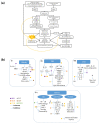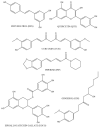Mechanistic Basis for the Role of Phytochemicals in Inflammation-Associated Chronic Diseases
- PMID: 35164043
- PMCID: PMC8838908
- DOI: 10.3390/molecules27030781
Mechanistic Basis for the Role of Phytochemicals in Inflammation-Associated Chronic Diseases
Abstract
Chronic inflammatory diseases occur in a large portion of the population and are associated with a poor diet. Key natural products found in fruits and vegetables may assist in lowering inflammation associated with chronic diseases such as obesity, diabetes, cardiovascular diseases, and cancer. This review seeks to examine the roles of several natural products, resveratrol (RES), quercetin (QUE), curcumin (CUR), piperine (PIP), epigallocatechin gallate (EGCG), and gingerol (GIN), in their ability to attenuate inflammatory markers in specific diseases states. Additionally, we will discuss findings in past and ongoing clinical trials, detail possible phytochemical-drug interactions, and provide a brief resource for researchers and healthcare professionals on natural product and supplement regulation as well as names of databases with information on efficacy, indications, and natural product-drug interactions. As diet and over-the-counter supplement use are modifiable factors and patients are interested in using complementary and alternative therapies, understanding the mechanisms by which natural products have demonstrated efficacy and the types of drugs they interact with and knowing where to find information on herbs and supplements is important for practicing healthcare providers and researchers interested in this field.
Keywords: complementary and alternative therapies; inflammation associated diseases; natural product drug interactions; natural products.
Conflict of interest statement
The authors declare no conflict of interest.
Figures


References
-
- Pahwa R., Goyal A., Bansal P., Jialal I. StatPearls. StatPearls Publishing; Treasure Island, FL, USA: 2021. Chronic Inflammation.
Publication types
MeSH terms
Substances
LinkOut - more resources
Full Text Sources
Research Materials
Miscellaneous

